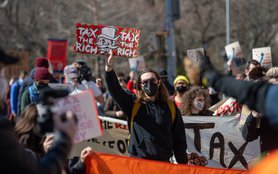Tax Day makes us wonder, once again, why working families are paying much higher tax rates than huge corporations and the wealthiest individuals. In a year when countless families are struggling to stay afloat, the question feels more urgent than ever.
For many, this was a year of turmoil and economic devastation. The pandemic pushed historically marginalized people out of the margins and to a breaking point. Whole sectors shuttered, throwing millions out of work. At the very same time, for those at the top, it was a year of skyrocketing profits and colossal wealth. In fact, U.S. billionaires got roughly $1.2 trillion richer during the pandemic.
But the biggest winner of 2020, by far, is Jeff Bezos, who saw his net worth jump by $85 billion since the start of the pandemic to $198 billion. His company, Amazon, saw profits nearly double, as hundreds of millions of families turned to online commerce for the things that got them through the lockdown. From food staples to masks to toilet paper to puzzles and streaming shows, Amazon provided it all.
Now, consider who should be paying the higher tax rate: the average worker, making around $50,000 per year; or Amazon, which made a profit of $66 million every day in 2020?
Here’s the truth: the average US worker pays a tax rate of 22%. Amazon’s federal tax rate has averaged around 4%. Over the past three years, the company has made $45 billion in profits in the US, while paying just $1.9 billion in taxes.
While this is jaw-dropping, the real problem is that Amazon isn’t doing anything illegal, or even especially tricky, here.
Because we have built a tax system that is more than unequal; it’s deliberately favoring the most wealthy and profitable, and squeezing working families who can least afford it. And this is much deeper than the Trump Tax Cuts in 2017, which reduced the corporate tax rate from 35% to 21%.
Indeed, our tax system has many opportunities that allow wealthy individuals and corporations to avoid paying taxes, and Amazon has mastered it. The company can reward rich executives with stock options as a tax write-off and carry forward operating losses from years. And it does.
So where do we go from here? We have a chance to recalibrate in front of us right now. President Biden’s American Jobs Plan and American Families Plan would go a long way to unrigging the rules that have allowed so many corporations and wealthy individuals to get away with paying so little in tax.
The American Jobs Plan would raise the corporate tax rate, close offshore tax loopholes, and decrease the incentive to offshore American jobs. The American Families Plan would raise the marginal rate for those earning more than $400,000, increase the capital gains rate for the wealthiest Americans, and provide much-needed resources to the IRS to make sure tax cheats pay their fair share. No one making less than $400,000 would pay more tax than they do now, and most would pay less.
We will never achieve a fair and equitable recovery from COVID-19 if we continue to have a system where corporations and the wealthy get richer while everyone else is left behind.
According to Oxfam calculations, if Amazon paid the current US corporate tax rate of 21% it would pay an additional $2.5 billion in taxes a year—enough to provide Supplemental Nutritional Assistance Program benefits (SNAP) to 1.7 million Americans facing hunger. A 3% wealth tax on Jeff Bezos alone would generate $6 billion in revenue from his $198 billion fortune, enough to provide childcare to every child under 4 in Amazon’s home state of Washington – 440,000 children.
And a “pandemic profits tax” to ensure that companies like Amazon that profited as a result of the pandemic are taxed fairly on their windfall gains would yield $11 billion in additional revenue from Amazon alone. That’s enough to vaccinate 580 million people around the world.
While many of us may dread filing our taxes, we also know that the money goes toward things that make it possible for our society to thrive. From interstate highways to national parks, from developing vaccines to supporting unemployed workers.
These services undergird our system, and just as individual taxpayers benefit from them, so do large corporations like Amazon. And they should be made to pay their fair share.



